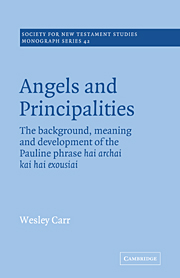 Angels and Principalities
Angels and Principalities Book contents
- Frontmatter
- Contents
- Preface
- Abbreviations
- General Introduction
- PART 1 The Background to Paul's Thought on the Powers
- PART 2 Exegesis of Pauline Texts
- PART 3 The post-Pauline development
- 6 Texts within the New Testament
- 7 Ignatius of Antioch
- 8 The angelomorphic Christology of early Jewish Christianity
- 9 The Greek apologists
- 10 Clement of Alexandria
- 11 The influence of gnosticism
- 12 Origen
- Conclusion to Part 3
- PART 4 Final Remarks
- Notes
- Select Bibliography
- Index
- Frontmatter
- Contents
- Preface
- Abbreviations
- General Introduction
- PART 1 The Background to Paul's Thought on the Powers
- PART 2 Exegesis of Pauline Texts
- PART 3 The post-Pauline development
- 6 Texts within the New Testament
- 7 Ignatius of Antioch
- 8 The angelomorphic Christology of early Jewish Christianity
- 9 The Greek apologists
- 10 Clement of Alexandria
- 11 The influence of gnosticism
- 12 Origen
- Conclusion to Part 3
- PART 4 Final Remarks
- Notes
- Select Bibliography
- Index
Summary
It has not been my aim in this section to study intensively the material of Christian history between the time of Paul and the writings of Origen. Rather, by selection of some of the most important and representative authors, I have attempted to show the trends of thought on demonic forces and upon Christ's relationship to them. In reading much of the ancillary material, which is not here discussed, I have found nothing that contradicts what is here presented.
The Judaeo-Christian tradition provides the basic material from which all later ideas develop. Thus the angels are generally understood as the servants and messengers of God. The understanding of demons and of evil is tied usually to two points. The first is that of exorcism, which, being still an experience of the Church, naturally fostered an understanding of demons that the Church found in its Gospels. The second is that of the fall of Satan, which at an early stage began to take precedence over the fall of man and the lust of the angels, with the consequence that a position of leadership and importance was attributed to Satan or the Devil, which he could not have held even in the extremes of Jewish apocalyptic. The image of the struggle was important both for the moral life of the Christians and later in understanding persecution and martyrdom.
- Type
- Chapter
- Information
- Angels and PrincipalitiesThe Background, Meaning and Development of the Pauline Phrase hai archai kai hai exousiai, pp. 172 - 173Publisher: Cambridge University PressPrint publication year: 1981
